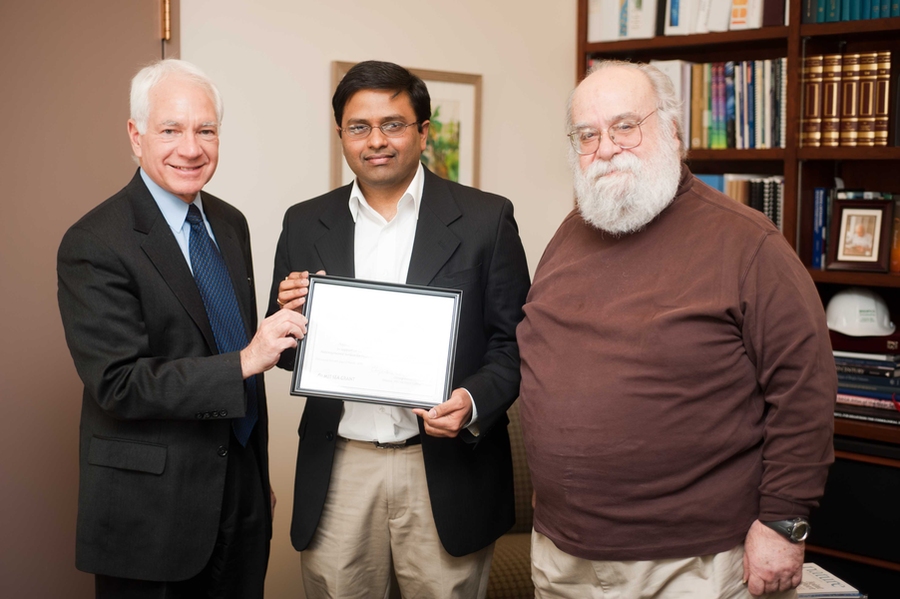The MIT Sea Grant College Program has selected Kripa Varanasi, d'Arbeloff Assistant Professor of Mechanical Engineering in the Department of Mechanical Engineering, as the recipient of the 2011 Doherty Professorship in Ocean Utilization. He will receive a supplemental award of $25,000 per year for two years.
Varanasi's research for the Doherty Professorship is titled, Nanoengineered Surfaces for Hydrate Mitigation in Subsea Oil and Gas Operations. The goal of this project is to conduct fundamental research that will greatly augment our understanding of emulsions under subsea conditions. Currently we know very little – for example, the physicochemical and environmental effects of the demulsifiers used to break down oil in the recent Gulf oil spill are still unknown. These systematic studies could eliminate the use of such energy intensive and environmentally unfriendly methods and protect our Oceans. The Deepwater Horizon blowout in the Gulf of Mexico demonstrated the pressing need to reconsider and significantly advance the state-of-art in subsea flow assurance technologies to monitor and prevent such catastrophic failures.
Prior to joining MIT in 2009, Varanasi was a lead research scientist and project leader in the Energy & Propulsion and Nanotechnology programs at the GE Global Research Center, Niskayuna, NY, and was the PI for the DARPA Advanced Electronics Cooling program. The primary focus of his research is in the development of nano-engineered surface, interface and coating technologies that can dramatically enhance performance in energy, water, agriculture, transportation, buildings and electronics cooling systems. Varanasi has filed more than 25 patents in this area. He was awarded the First Prize at the 2008 ASME Nanotechnology Symposium and won several awards at GE Research Labs including Technology Project of the Year, Best Patent Award, Inventor Award and Leadership Award. Most recently he received the MIT-Deshpande Award, 2010 IEEE-ASME ITherm best paper award, NSF CAREER Award and DARPA Young Faculty Award. Varanasi leads the Lab for Nanoengineered Surfaces, Interfaces, & Coatings at MIT.
Endowed by the Henry L. and Grace Doherty Charitable Foundation, the Doherty Fellowship encourages promising, non-tenured professors to undertake marine-related research that will further innovative uses of the ocean's resources. The area of research may address any aspect of marine use and/or management, whether social, political, environmental or technological.
The mission of the MIT Sea Grant College Program is to employ innovative research, education and outreach strategies to responsibly use and sustain the vital marine resources of Massachusetts. The issues we address manifest locally but many are global in nature. Compelling challenges demand our attention as a solo entity and in partnership with other groups living and working on the coasts and at sea. MIT Sea Grant brings the substantial intellectual abilities of the Massachusetts Institute of Technology and our sister universities to bear on ocean-related challenges requiring an extraordinary technical contribution. In meeting these challenges, we expand human understanding of the ocean and establish the infrastructure to sustain the initiatives and talent pool needed to address complex issues of critical and fragile marine resources.
Varanasi's research for the Doherty Professorship is titled, Nanoengineered Surfaces for Hydrate Mitigation in Subsea Oil and Gas Operations. The goal of this project is to conduct fundamental research that will greatly augment our understanding of emulsions under subsea conditions. Currently we know very little – for example, the physicochemical and environmental effects of the demulsifiers used to break down oil in the recent Gulf oil spill are still unknown. These systematic studies could eliminate the use of such energy intensive and environmentally unfriendly methods and protect our Oceans. The Deepwater Horizon blowout in the Gulf of Mexico demonstrated the pressing need to reconsider and significantly advance the state-of-art in subsea flow assurance technologies to monitor and prevent such catastrophic failures.
Prior to joining MIT in 2009, Varanasi was a lead research scientist and project leader in the Energy & Propulsion and Nanotechnology programs at the GE Global Research Center, Niskayuna, NY, and was the PI for the DARPA Advanced Electronics Cooling program. The primary focus of his research is in the development of nano-engineered surface, interface and coating technologies that can dramatically enhance performance in energy, water, agriculture, transportation, buildings and electronics cooling systems. Varanasi has filed more than 25 patents in this area. He was awarded the First Prize at the 2008 ASME Nanotechnology Symposium and won several awards at GE Research Labs including Technology Project of the Year, Best Patent Award, Inventor Award and Leadership Award. Most recently he received the MIT-Deshpande Award, 2010 IEEE-ASME ITherm best paper award, NSF CAREER Award and DARPA Young Faculty Award. Varanasi leads the Lab for Nanoengineered Surfaces, Interfaces, & Coatings at MIT.
Endowed by the Henry L. and Grace Doherty Charitable Foundation, the Doherty Fellowship encourages promising, non-tenured professors to undertake marine-related research that will further innovative uses of the ocean's resources. The area of research may address any aspect of marine use and/or management, whether social, political, environmental or technological.
The mission of the MIT Sea Grant College Program is to employ innovative research, education and outreach strategies to responsibly use and sustain the vital marine resources of Massachusetts. The issues we address manifest locally but many are global in nature. Compelling challenges demand our attention as a solo entity and in partnership with other groups living and working on the coasts and at sea. MIT Sea Grant brings the substantial intellectual abilities of the Massachusetts Institute of Technology and our sister universities to bear on ocean-related challenges requiring an extraordinary technical contribution. In meeting these challenges, we expand human understanding of the ocean and establish the infrastructure to sustain the initiatives and talent pool needed to address complex issues of critical and fragile marine resources.






